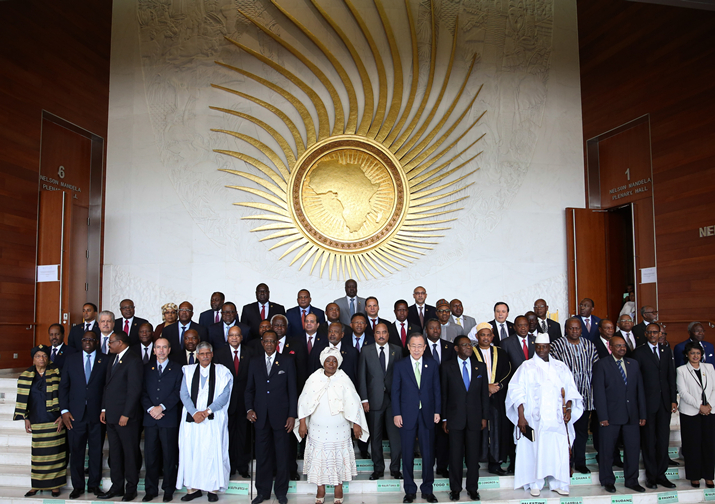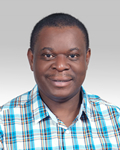|
|||||||||||
|
|
| People-centered Development |
| Peace, security and UN reforms top the AU Summit 2016 agenda |
| By Bob Wekesa | VOL. 8 March 2016 |
 |
|
Heads of the member states of the African Union pose for a group photo with UN chief Ban Ki-moon at the 26th AU Summit |
 |
Investing in peace
The connecting thread between human rights, the AU theme, and peace and security is that war fuels poor human rights situations on the continent. The AU leadership, therefore, realizes investment in peace and security would enhance human rights across the continent. Peace efforts in conflict-prone regions of Africa would, for instance, ensure that communities are not uprooted and exposed to poor living conditions in refugee camps.
How the AU works to fulfill its mandate will be closely watched this year. What is certain is that it is not yet strong enough to be self-reliant to implement its peace and security architecture. Countries such as China have come in to support the AU and individual African countries by contributing to peace and mediation negotiations, as well as sending peacekeepers.
On the geopolitical front, the heads of state discussed the long-running UN reform question at the 26th summit. In 2008, the AU deemed it necessary to establish the Committee of 10 on UN Reform. The objective was to push for better representation of Africa, the continent with the largest number of UN member states, in the UN system generally, and in the UN Security Council specifically. At the January AU Summit, a report was presented by Sierra Leone President Ernest Bai Koroma, Chairperson of the committee. Although Africa has received support from countries such as China in the push for equity in representation at the UN, several factors have prevented the achievement of this objective. One reform challenge is deciding which African country should have a seat on the UN Security Council, with competition fiercest among South Africa, Nigeria and Egypt.
Strength in numbers
While this challenge is internal, it is taken that the external one is that Western powers with veto power do not countenance sharing their power and privilege. Still, African countries have some leverage, such as their member number, which they haven't used thus far. This was understood to have been discussed at the summit. If Africa uses its number strength, the international architecture could be substantially shaken.
Other key issues on the agenda were an internal review mechanism for issues such as democracy and governance (led by Kenyan President Uhuru Kenyatta), the post-2015 development agenda (Liberian President Ellen Johnson Sirleaf), climate change (Egyptian President Abdel Fatah Al-Sisi) and water and sanitation (Rwandan President Paul Kagame).
The fact that women's rights were included in the AU Summit theme for 2016 demonstrates the significance placed on the gender dimension of Africa's development. The theme last year was women's empowerment and development toward Africa's Agenda 2063. Gender with regards to women has stayed at the top of the AU agenda for two successive years.
This does not emerge from nowhere. The African Union's development blueprint Agenda 2063, adopted in 2015, placed gender equality at the heart of long-term continental development. It is informed by huge disparities between men and women on the continent, often based on traditions, rites and culture. The Beijing Declaration and Platform for Action, adopted in Beijing in 1995 by the Fourth World Conference on Women: Action for Equality, Development and Peace, laid down a raft of actions that countries ought to have implemented. However, internal reviews have shown that most African countries, save for shining stars such as Rwanda, remain woefully below par.
Drivers of change
Agenda 2063 is generous in terms of women's role in Africa's socio-economic development. Women are recognized alongside the youth and the elderly. The document envisages women attaining their "full potential" with the understanding that women performing to the best of their ability would contribute to societal advancement. The thinking is that Africa has not tapped into women as a resource; doing so would "unleash" a latent potential.
Retrogressive thinking holds that women can be involved in only certain sectors of economic production. Agenda 2063 encourages governments and other interested parties to utilize women as drivers of change in diverse fields. Sectors considered masculine, such as farming, would be made attractive to women through modernization and abandoning primitive farming tools.
A key consideration is that women should be empowered, which confirms the fact that African women are largely disempowered at various levels of society. Of particular concern are rural women, who generally do not have access to productive assets such as land. This has led to women being prevented access to credit with which to undertake income-generating ventures. This is a form of discrimination that ultimately holds back a sizable chunk of the African populace.
Violence against women
Women in certain societies cannot even start thinking of engaging in productive sectors because they are denied basic rights. Violence against women is standard practice, particularly in rural areas. Many regions still promote practices harmful to women, such as marrying off young girls and subjecting them to genital mutilation.
These are some of the issues the AU will be grappling with as it seeks to fully include women in Africa's transformation agenda. The fact that women's issues have been specifically mentioned in the AU's themes for two years running is testament to the gravity of gender inequality on the continent. More importantly, it is a demonstration of the willingness to tackle the challenges that hold African women back and therefore, hold the entire continent back.
(The author is a postdoctoral fellow at the University of the Witwatersrand, South Africa)
|
|||
| Copyright ChinAfrica All right reserved 京ICP备08005356号 |